
As we age, we tend to become busier. It becomes more difficult to keep up relationships, especially if we’re not used to prioritizing connecting with elders of the family. Time goes on and we drift apart. Unfortunately, this means seniors miss out on a number of benefits that come along with keeping deep and lasting connections with family members.
An outside line
For many seniors, having family nearby or involved in their lives gives them a line to the outside world. They may not be able to travel or attend large events themselves. For some seniors, that means there may not be much to look forward to on a daily basis. Even if they’re limited in what they can go do, they can live vicariously through loved ones. In the process, they can also learn more about the world just by listening.
Push off loneliness
Loneliness is one of the most difficult emotions to deal with. Unfortunately, its prevalence only grows. As we age, our social circles may start to shrink. Seniors may not get out as much due to barriers with transportation or mobility. Communication becomes harder, and health issues may keep us from reaching out to others. On top of that, families often struggle to maintain communication across large distances. Loved ones who play a caregiving role often feel strung out and tired, leaving less time to enjoy a relationship versus managing a senior’s needs.
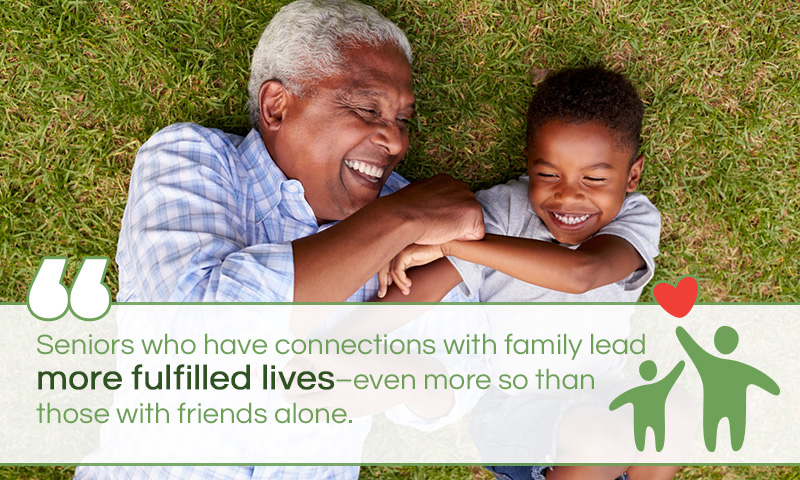
Seniors who have connections with family lead more fulfilled lives–even more so than those with friends alone. More people who care about you cuts down on feelings of loneliness and can help with depression as well.
Families who have a home health aide fair better. The stress of caregiving can be handled by a professional, allowing family members to do what’s best for everyone–be family.
Help with activities
As we age, we may stop being able to complete Activities of Daily Living (ADLs) like grooming, toileting and walking. We also tend to have more difficulty completing Instrumental Activities of Daily Living (IADLs) such as managing finances and preparing meals. Having closer relationships with family members means more opportunities to receive the right kind of supportive and non-judgmental help. Seniors may be more likely to ask family members for assistance with these tasks, partially due to potential embarrassment or trust.
Higher self-esteem
People who are lonely can easily fall into a feedback loop of being concerned about why others don’t spend time with them. It isn’t hard to focus on the negatives in life like that. Thankfully, those who are able to be more social find they have a higher level of self-esteem. This is especially true when family is involved.
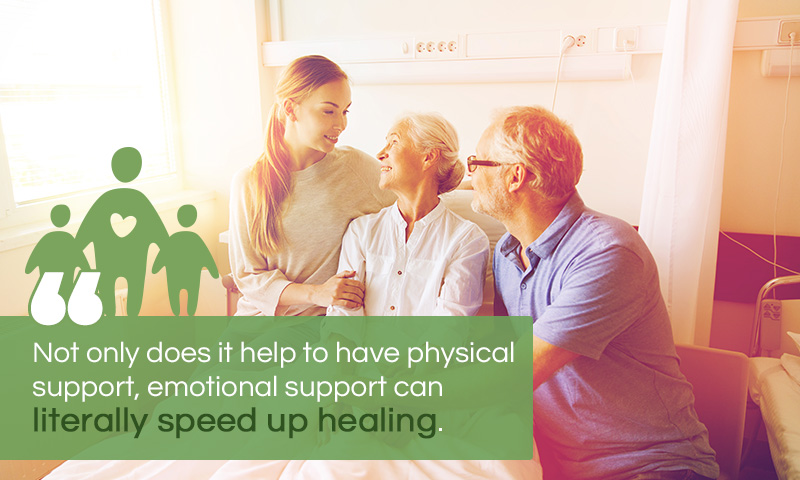
Help with recovery from illness and injury
Having close connections to loved ones can help people recovering from health issues. Not only does it help to have physical support, emotional support can literally speed up healing. It can also help lower blood pressure, boost the immune system and lower inflammation levels. Overall, seniors with more familial connection have better health. The more connections people have, the more the benefits help.
Peace of mind
Many seniors feel peace of mind knowing that family is there for them, regardless of physical distance. It’s comforting to know that you have people in your corner who want the best things possible for you.
Improved mental health
Close family connections help seniors feel fulfilled, comforted and loved. This can all lead to a major improvement in mental health. Since seniors connected with family are more likely to have people that care about them around, they’re more likely to get help when they need it. They’re also more likely to have people to vocalize concerns or rant to.
Better brain health
Seniors who have more social interactions keep higher levels of cognitive function longer. Their memories do not deteriorate as quickly as their lonely peers. Seniors who stay in touch with family and close friends also have a lower risk of dementia.
 Positive memories
Positive memories
Visiting and spending time with seniors in your life can help bring up or even create new happy and positive memories. This is especially important for people struggling with dementia and other memory issues. Visits that involve the senses–sight, sound, touch, smell and taste–tend to last the longest. Spend time cultivating more sense-based memories.
Better lifestyle choices
People with better family connections tend to make better overall lifestyle choices. This may be due, in part, to wanting to extend their lives and spend more time with loved ones. Family can help reinforce messages about healthy living from medical providers as well, giving seniors more support.
Get help navigating changes
Of course, no article on the importance of familial connections would be complete without mentioning changes. Staying connected with younger family like grandchildren helps keep seniors young in heart and mind.
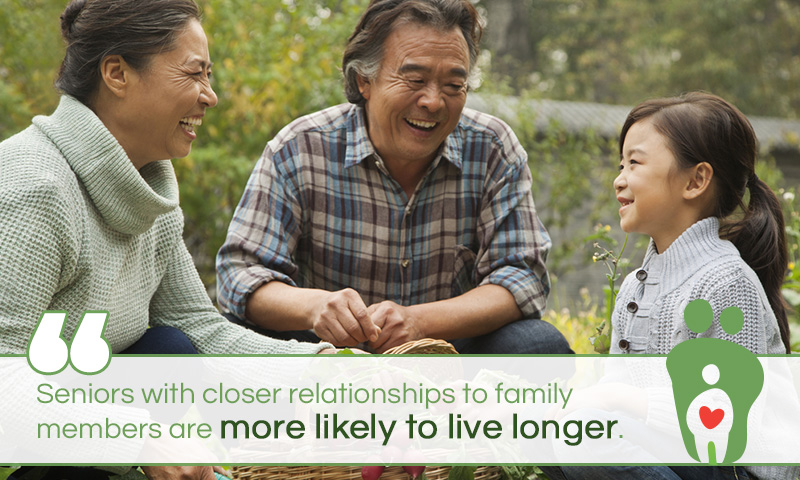
Longer life
According to the American Sociological Association, seniors with closer relationships to family members were less likely to die within the next five years than other seniors. While having a large friend group can decrease your likelihood of mortality, too, it doesn’t do so on the same level.
Passing on knowledge
Seniors who have more connections with young people thrive. Having the ability to pass on their knowledge and lived experience to the next generation can give seniors a sense of purpose and fulfillment. Children benefit from these interactions, too, including a feeling of belonging and sense of security.
Where you came from
Genealogy is increasing in popularity with sites like Ancestry and 23andMe. Thankfully, keeping a close family connection can let older generations pass on the information they know about the family tree–without a pricey subscription. Working with a senior to capture their life story can be a great way to share more about where you’ve come from to future generations.
Future planning
While it’s not something we like to talk about often, having connections to family can help seniors share their wishes in case of medical emergencies or worse. It isn’t an easy conversation to have, but one that we should all plan for.
Staying connected is easy
There are so many ways to stay connected with the seniors in your life. Skype and other video services allow you to see and interact with people on the other side of the world. Emails, texts and social media are solid options for people constantly on the go. For those less involved with technology, calls, letters and visits continue to be great options.
How to Stay Connected with Family
-
- Take a Trip Together—Looking for a great way to reconnect with family members from out of town? Going on a trip together is an awesome way to catch up and rekindle close bonds. It’s also good for your mental and physical health. Did you know that traveling actually comes with measurable health benefits and may even help you live longer? That means you’ll reap the benefits of travel and close connections at the same time!
- Exercise Together—When people work out together, they create an accountability process. This keeps people more active overall because others are involved, too. It can also create fun, long-lasting memories that comfort us throughout our lives. Plus, we could all use a little more activity throughout our day. If you’re being active with young kids, you’re helping them get into the habit early which can curb obesity in adulthood.
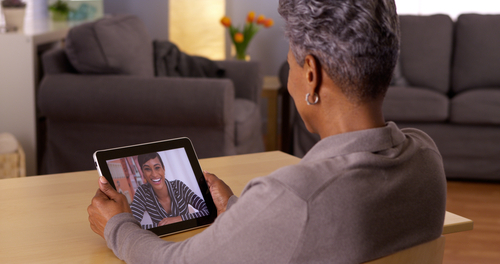
-
- Skype or FaceTime—There’s something special about seeing the person you’re speaking to. It can help us communicate more clearly and effectively, and can be especially helpful to see the person you’re talking to for those who are hard of hearing. Video chats can bring along many of the same benefits as face-to-face interactions, especially for small children.
-
- Use Social Media and Email—For all the flack social media gets, it can be a wonderful way to connect with others, learn and see the world. It’s a great way to stay in touch with loved ones, see their adventures and watch them grow. You can share special times with friends, too, which invokes happy memories. There are even social networks specifically for seniors making it easier to keep in touch with friends, regardless of where you are. Email is required for any social media account, but it offers great options as well. It is nearly-instant communication. People are able to share information and pictures from around the world at no cost within a matter of minutes.
-
- Host a Party—Social gatherings provide people space to come together and bond over good food, games and more. Get-togethers allow people to see family members they haven’t seen in a while, rekindling old relationships. At the same time, laughter and familial bonds can (hopefully) create a stress-free and comfortable environment. It’s a great way to relieve tension. Breaking bread together helps increase trust levels, too.
-
- Offer to Babysit—When seniors and kids get together, magic happens. Everyone comes away with a renewed sense of purpose, better understanding of others and even higher cognitive function. Children exhibit fewer behavioral and emotional issues when they’re close with their grandparents or other seniors. Being exposed to new ideas and different ways of doing things also allows kids the chance to exercise more personal autonomy, which can help learn open-mindedness.
- Catch a Ballgame—Watching sports is a quick and easy way to bond with others. Games like baseball have somewhat complicated rules. This offers seniors space to impart knowledge to others. Viewing games at home can be the easiest way to bond, especially during the fall. Attending games in person can make space for even more bonding activities and creating positive memories. There’s nothing like the experience of sharing space in a stadium with loved ones watching a game you love.
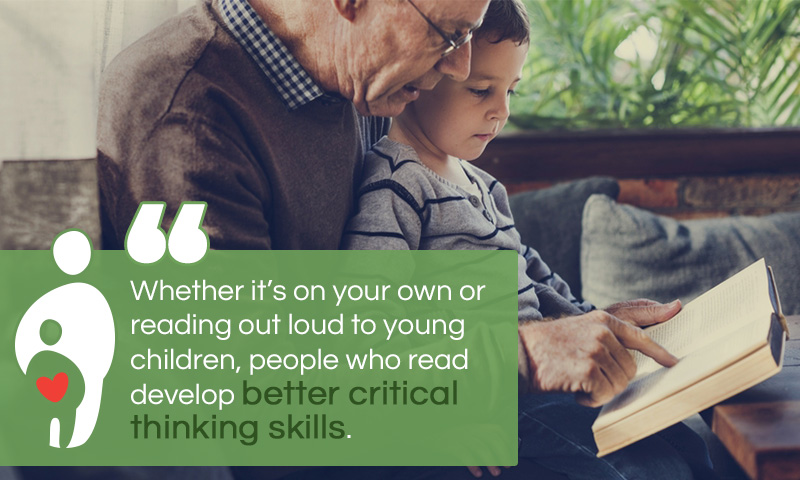
-
- Read Together—Whether it’s on your own or reading out loud to young children, people who read develop better critical thinking skills. This is especially true when they discuss books with others. Consider forming a book club with other members of your family. Even if you can’t meet in person, you can discuss a book over social media or email.
-
- Play 20 Questions—Some of the best bonding opportunities pop up when we’re thinking of hypothetical situations. Playing games like 20 Questions allows you to build emotional intimacy with and gain trust from others. Plus, it can help flex and grow your imagination muscles! Most of us won’t win a million dollars, but it is fun to think about what we would do with it.
-
- Head Outdoors—Being outdoors is vital for people of any age. It’s how our body best processes vitamin D, and low levels of this vitamin are linked to conditions such as heart disease, diabetes and rheumatoid arthritis. Even if you have one of these conditions, supplementing your vitamin D by being outside may still help. Time spent in nature boosts mental health, leading to improvements in both mood and self-esteem. Being in nature can restore calm, and that’s something we can all use a little more of.
- Share Your Favorite Recipes—Sharing your favorite recipes with loved ones is a great bonding activity. Not only does it give you time to share delicious food, but you are able to pass on family history at the same time. Take the time to write out your favorites or ask younger generations what recipes they wish they had. Interweaving personal stories into a family cookbook is sure to create a priceless family heirloom to be treasured for ages. And the best part? You can enjoy it with them.
]]>

